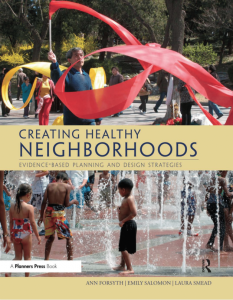The Harvard Graduate School of Design’s Ann Forsyth has been honored by the Environmental Design Research Association (EDRA) with a 2018 Great Places Award for her recent publication Creating Healthy Neighborhoods: Evidence-based Planning and Design Strategies, co-authored with Emily Salomon and Laura Smead. The EDRA’s Great Places Award program recognizes achievements in four categories—place design, place planning, place research, and books—and celebrates winners at its annual conference.
The EDRA’s Great Places Awards seek to recognize work that combines expertise in design, research, and practice, and that contributes to the creation of dynamic, humane places that engage attention and imagination, according to the EDRA. The prize jury seeks projects and designers that reflect an interdisciplinary approach that is “enduring, human-centered, sustainable, and concerned with the experiential relationship between people and their environment (built and natural) over time,” and that “show how research and/or public participation is linked to or part of an environmental design practice, and vice versa.”
The EDRA honored Forsyth and the rest of the 2018 Great Places Award winners during the organization’s annual convention on June 7 in Oklahoma City.

Published in September 2017 by APA Planners Press and Routledge, Creating Healthy Neighborhoods: Evidence-based Planning and Design Strategies offers ideas and guidelines for good planning and design, filtered through the lens of health. Forsyth and her co-authors present research about health and well-being into practical guidelines and considers how planners, designers, civic leaders, and activists can create places that reflect a broader concept of health or well-being. The authors use guidance based on research findings where those are available and fill the research gaps using frameworks about how health and place are related more generally and in relation to specific topics and types of places. In addition, the process of implementing new ideas is not unique to health but rather draws on a larger base of research evidence and professional experience.
At the GSD, Forsyth is Professor of Urban Planning, as well as a Senior Faculty Fellow at Harvard’s Joint Center for Housing Studies, an affiliated Faculty Member at the Harvard Center for Population and Development Studies, a Faculty Associate at the Harvard University Center for the Environment, and a Faculty Associate at the Weatherhead Center for International Affairs.
Trained in planning and architecture, Ann Forsyth works mainly on the social aspects of physical planning and urban development. The big issue behind her research and practice is how to make more sustainable and healthy cities. Forsyth’s contributions have been to analyze the success of planned alternatives to sprawl, particularly exploring the tensions between social and ecological values in urban design.
Several issues prove to be the most difficult to deal with in planning better places and provide a focus for some of her more detailed investigations: suburban design, walkability, affordable housing, social diversity, and appropriate green space. In doing this work she has created a number of tools and methods in planning—an urban design inventory, GIS protocols, health impact assessments, and participatory planning techniques.
Forsyth is also a reflective practitioner/theorist and has created several new ways of understanding social and intellectual diversity in planning and design. Her education includes a B.Sc. in architecture from the University of Sydney, M.A. in urban planning from UCLA, and Ph.D. in city and regional planning from Cornell.